(This four-part article describes the legacy of the Snow Valley Basketball School on coach development and the game of basketball)
————
Herb Livsey has a lot to be proud of when it comes to Snow Valley. Herb was responsible for establishing a tradition of teaching excellence at the basketball school: A way of teaching that would forever change the way basketball is taught. “We would not go against the basic fundamentals. You would never hear that at Snow Valley we taught something outlandish or different,” said Livsey. “We would teach fundamental basketball. The skills have never changed. To this day, you still have to be able to pass, dribble, shoot, defend, understand team defense and rebound the ball.”
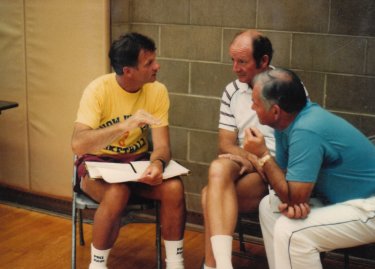
Herb Livsey (yellow shirt). Photo credit: Steve Middleton
After Livsey left the camp in 2001, he was still involved. “He would see a guy teach and call me up and say you need to hire this guy for Snow Valley,” recalls Wayne Carlson. “He did that until 2016. So the school was still very much a part of him and he wanted it to succeed and do well.”
During Livsey’s 40-year Snow Valley journey there were many contributors. The first, was Chuck Walker. Walker and Livsey met at Winnemucca High School in Nevada. Both teachers at the school, Herb was the basketball coach and Chuck was the football coach. Each served as the other’s assistant. When Herb decided to start Snow Valley, Chuck agreed to become a partner in running the camp. Walker helped Livsey in all aspects of the camp; from painting court lines on parking lots, to building bleachers and backboards, to the daily operation of the camp. In addition, Walker became a mentor to many coaches that worked Snow Valley over the years.
Livsey and Walker, complimented each other well. In a short time both men moved on from Winnemucca. Livsey went on to Costa Mesa High School (CA) and Walker enrolled at the University of Utah to pursue a Ph.D. They continued to operate Snow Valley each summer. Walker would eventually land at Fort Lewis College in Colorado, serving as a member of the faculty for 31 years. Walker left Snow Valley in 1984.
In addition to Walker, Livsey is quick to credit other coaches who made contributions to Snow Valley. Stan Morrison was one of these. Morrison built a hall of fame career in collegiate athletics in the state of California. First as a student-athlete at the University of California, where he played center under Pete Newell; then as a collegiate coach and athletic administrator for over 45 years (California Sports Hall of Fame, 2018). Morrison started working Snow Valley during his brief stint as a high school coach in the mid 1960’s. A great teacher, his specialty was post play.
Livsey recalls, “Stan and I would get the big kids up in the morning and we went to the courts before breakfast to work on post moves. That was the birth of going early every day before breakfast.” The early-bird session became a staple of the Snow Valley Way. A concept, like others that evolved over the years. An approach established because Livsey was open to new ideas and willing to learn from the coaches he brought to teach, especially when he thought it would improve the learning environment.
Morrison is one in a long list of contributors: Too many to mention. Hundreds of coaches, each uniquely enriching the learning environment at Snow Valley – helping Livsey establish a tradition of teaching excellence.
Mountains to Corn Fields
Already spending his summers in California, Don Showalter convinced his coaching colleague in Iowa and good friend, Jerry Slykhuis to join him at Snow Valley in Santa Barbara. A long serving biology teacher and coach at Cedar Falls High School in Iowa, Jerry Slykhuis was known as a student of the game. His scholarly approach may have developed out of necessity. His athletic career focused on football. Jerry never set out to be a basketball coach. But as a young teacher and assistant football coach at Fort Madison, Iowa in the late 1960’s, the basketball team needed a coach and Slykhuis accepted.
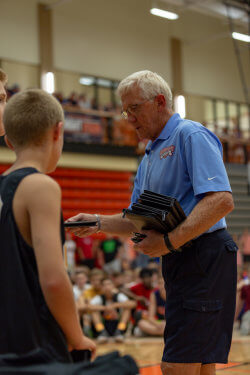
Coach Jerry Slykhuis. Photo Credit MD Janiska
After a few years at Fort Madison, Coach Slykhuis took a position at Iowa’s Cedar Falls High School. A patient teacher, Slykhuis cherished the learning process. He role-modeled and demanded a strong work ethic. A competitive spirit highlighted his fiery side. At the same time, he could connect with kids. “He is really good with kids,” says Don Showalter. “I always felt his greatest asset is he could always read people really well.” Coach Slykhuis won 531 contests in 39 years as a high school basketball coach. In 2009, the Iowa High School Athletic Association inducted him into the Hall of Fame (Aguirre, 2016).
By the early 1990’s the Snow Valley Basketball School was well-established as a leader of basketball instruction in the United States. The Snow Valley Way was firmly entrenched as the premier method to teach basketball skills. But by now the basketball camp environment was changing. “At that time everything was going to team camps. Colleges had team camps. High Schools went to team camps,” shared Showalter. “So there was really not as much teaching the game as there was playing.” Showalter and Slykhuis felt that there was a real niche for a camp like Snow Valley in Iowa.
In 1994, Showalter and Slykhuis with Herb’s blessing and assistance, operated the first Snow Valley Iowa Basketball School. “He (Herb) was an amazing help. He came out to camp and did some clinics,” recalls Showalter.“I think he was kind of proud of the fact that we wanted to start a camp that he had originally initiated.”

Don Showalter – Snow Valley Iowa. Photo Credit MD Janiska
Snow Valley Iowa
The first year, Snow Valley Iowa enrolled 80 kids for one week and hired 9 coaches. Today, at Wartburg College, enrollment ranges from 1300 to 1500 participants across four sessions with 40 to 50 coaches working a session. Using the blueprint Livsey created, Showalter and Slykhuis made only minor changes to the schedule – mainly to maximize facility space. Otherwise the organization of the camp remained very similar to the camp in California.
For the instructional clinics this meant securing some of the top teachers of the game. These included Tates Locke and Mike Dunlap, long-serving Snow Valley coaches from California; Rod Baker and Dave Bollwinkel, veterans of the collegiate ranks and NBA scouts; Mike Procopio, Dave Severns, and Tom Sterner, elite player development specialists; and the best local high school and collegiate coaches, mostly young coaches who were hired under the premise they would develop. In recent years, an influx of coaches with international playing and coaching experience have served on staff. “We hired coaches who could take direction,” states Showalter. “Could they watch somebody else present a clinic and then teach the way the lead clinician was teaching the kids at their basket?”
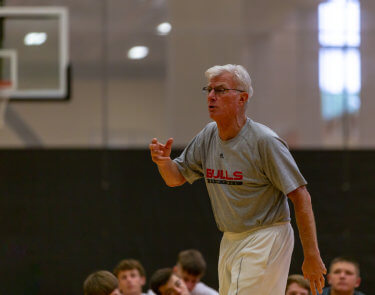
NBA Scout and Snow Valley Coach Dave Bollwinkel. Photo Credit MD Janiska
Showalter and Slykhuis surrounded themselves with a trusted few to help administer the camp. A loyal contingent of great teachers including: Chris Kern, Showalter’s long-time assistant coach a Mid-Prairie High School (IA); Dave Schlabaugh, the head men’s basketball coach at Cornell College (IA), who also assisted Showalter at Mid-Prairie; Dick Peth, the head men’s basketball coach at Wartburg College (IA); and Ken Spielbauer, the long-time head coach at Wapello High School (IA). The camp administrators, whether in California or Iowa operated like guardians of the game. Protecting the quality of instruction, while helping to expand the teaching of basketball fundamentals.
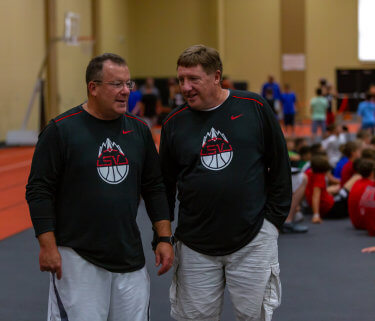
Camp Administrators Chris Kern and Ken Spielbauer. Photo Credit MD Janiska
Livsey’s influence was evident, but Showalter and Slykhuis put their own stamp on the camp. For example, Slykhuis was working another basketball camp in Iowa when a game caught his attention. Excited to bring the idea to Snow Valley Iowa, Slykhuis made a few adjustments and introduced the game. He named it Survivor. Survivor involves continuous action that starts with a 5 on 5 scrimmage situation eventually crowning an individual winner. It quickly became a camp favorite and is played the final evening of camp. With the introduction of Snow Valley Iowa the Snow Valley Way grew. Offering more opportunities for young athletes and impacting a new generation of coaches.
The Next Generation
Charged to lead a series of instructional clinics, Jason Kern’s energy complements his teaching ability. At 29, Kern is the head boys’ basketball coach at West Branch High School east of Iowa City. He grew up at Snow Valley Iowa. His father Chris Kern a long time Snow Valley Iowa camp coach would bring him and his brother along each summer. Jason signed on to work Snow Valley straight out of high school. His approach to coaching illustrates the influence Snow Valley can have on a young coach and he recognizes the impact.
“There is just a wealth of knowledge here. There are people as young as me giving lead clinics. Then there are people like Coach Showalter giving lead clinics,” states Kern. “You can learn from everybody here. It’s a great place to talk to coaches that are successful and see what they do.”
Kern is part of a new generation of coaches influenced by the Snow Valley Way. A distinction he shares with Caleb Lewis.
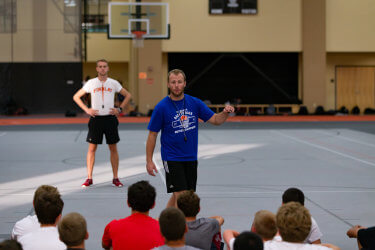
Jason Kern leading an instructional clinic. Photo Credit MD Janiska
Lewis, the head boys’ basketball coach at English Valley High School in Iowa, heard working Snow Valley was tough. Long days and the high coaching expectations. “I came in as a junior high coach with a lot of playing experience but not a lot of coaching experience,” states Lewis. “I had just as much energy and passion as anybody and I felt like I had to use that and go with it.” Caleb’s passion and energy caught the attention of camp administrators and he began to get more opportunities. Over two sessions this past summer he was in charge of ten instructional clinics.
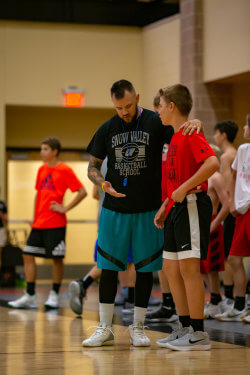
Caleb Lewis instructing a Snow Valley camper. Photo Credit MD Janiska
Lewis and Kern are recipients of a culture where younger coaches can thrive and learn from established coaches. They can share ideas and receive feedback, while honoring the customs and practices of the camp handed down by veteran coaches.
After 16 years of working the camp, Jacob Brindle finds himself becoming the veteran coach, the one to impart wisdom on the younger coaches working Snow Valley for the first time. The head boys’ basketball coach at Cascade High School in Cascade, Iowa, Brindle led the Cougars to a 2A state championship in 2018. He has spent his entire career at Cascade High School, starting as an assistant coach before moving into the head coaching role. He credits working Snow Valley each summer in advancing his skills as a teacher of the game. “That first year I was just overwhelmed,” said Brindle. “Then each summer you come back. You get into it and you start reflecting as a coach.” He now tells young coaches it’s okay to learn and ask questions. “Coaches are eager to share,” says Brindle. “We are all just trying to get better.”
Matt King recently completed his 7th summer working Snow Valley Iowa. A natural fit, he quickly embraced the Snow Valley Way and in a few short years was elevated to director of the Eastern Division. King quickly recognized how Snow Valley influenced coaches beyond basketball. “If there’s anything I have learned from Snow Valley, it’s how to treat people,” shares King. “No person is more important than anybody else. A youth coach has the ability to interact with an NBA coach across the four days of camp. There are no lines in the sand at Snow Valley.”
King found success as a high school coach in Arizona and today serves as the Executive Director of the Arizona Basketball Coaches Association. He is part of a new generation of leaders at Snow Valley, and like his predecessors, ready to protect and grow the game of basketball for decades to come.
King, along with Brindle, Kern, and Lewis represent what Showalter refers to as “Snow Valley Guys.” A coach who buys into the Snow Valley Way and desires to share it with others. A leader of young people. A teacher of skills. A coach committed to making a difference in the way they teach the game and willing to work hard to get better. More importantly they each give as much as they receive, helping to create a community of coaches that learn and support each other.
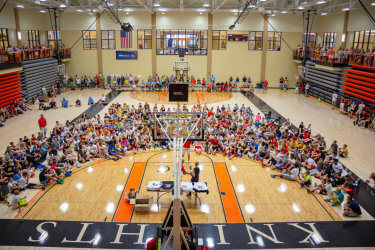
Snow Valley Iowa. Photo Credit MD Janiska
A Supportive Community
Stephen Carter needed to get back to the courts for the camp staff meeting. He maneuvered Jerry Slykhuis’ car with caution, weaving among the crowd of parents and kids. Slykhuis had let him borrow the car to run an errand. It was the first day of camp. A feverish couple of hours. Parents asking questions. Kids navigating dorms and finding their way. Hugs and goodbyes. A few campers apprehensive at the sight of their parents departing and possibly their first time away from home. Older, experienced campers eagerly waving goodbye, excited for a week with their friends.
Carter glanced around for an open parking spot. Nothing. Then jackpot! The perfect spot appeared. He parked the car and never gave it another thought. Later that day, Slykhuis found Carter. He produced a picture on his phone showing his car sitting in a no parking zone. A parking ticket peeking out from the windshield. Slykhuis razzed Carter the rest of the week. He also refused Carter’s pleas to pay the ticket. That was Jerry. Both actions, demonstrating the man many knew him to be.
“Guys like that (Jerry) are why we (coaches) come,” shared Carter. “The people you meet. How things are done. It sets a standard for everybody.” The camaraderie, the shared experience, and the bonds that form create a culture where coaches feel supported. Snow Valley Iowa coach John Walz was another recipient of that support. A high school coach in Northwestern Iowa and a father of three, Walz lost his wife to cancer in 2015. “Some of the first people that reached out to me were Snow Valley coaches,” said Walz, “When we had my wife’s funeral, we had a great showing of coaches from Snow Valley, some driving as many as five hours to get there.”
The support system of Snow Valley coaches would be tested when tragedy struck in December of 2016. Jerry Slykhuis and his wife Jane were traveling a rural highway, Route 56 in Western Kansas. A semi-trailer truck ran a stop sign. Both were instantly killed. The news rocked the Snow Valley community. A mentor, friend, and teacher had been suddenly taken.
When coaches have convened in Iowa the past two summers for camp, memories of Coach Slykhuis are a part of many conversations. Slykhuis had a way with people. He touched countless lives and left a lasting impact on many Snow Valley coaches. Considered a cornerstone of this supportive environment, Slykhuis was a part of a community that could lift a coach up when down. A place where coaches could go to love the game again.

Wartburg College Gym home of Snow Valley Iowa. Photo Credit MD Janiska
Where Coaches Go to Love the Game Again
Steve Middleton was busy balancing the life of a teacher and coach, with a young family. The atmosphere surrounding his coaching role with his athletic director had become uncomfortable, eventually forcing Middleton to step away from his coaching role. But he kept coming back to Snow Valley California each summer. “Snow Valley is what kept me in coaching during that time. That became my outlet,” recalls Middleton. “I was around the game’s finest and they valued me and made me feel that I did a good job teaching and coaching. I belonged with them.”
Livsey was known to pick up the phone when a Snow Valley coach was fired, to check on them and make sure they would be at camp that summer. For the coach, Snow Valley became more than a place where a coach became better through instructional clinics, the standard of teaching excellence, or connecting with a vast network of coaches. It became a net to catch you when you were falling.
Brandon Henderson had just resigned his head coaching position. He remembers it feeling like the lowest point in his coaching career. Then a friend, a Snow Valley Coach, encouraged him to work Snow Valley Iowa with him that coming summer. Henderson, already a Snow Valley veteran, attended Snow Valley California as camper and then with the assistance of his prep coach started working the camp. For ten years he developed strong ties with other coaches. Henderson agreed to his friend’s request. He had always felt support from the Snow Valley community, but when he really needed it, they came through.
“I was working as a basket coach in Iowa and Matt King came up to me and told me to keep fighting and get back into coaching,” recalls Henderson. “Having him go out of his way for me, is an example of the type of support Snow Valley provides for coaches. A place for coaches to get back on their feet after a rough season.” For Henderson, Snow Valley holds a special place in his heart, a community of coaches that helped him rekindle his love of the game.
“It’s like a rehabilitation center for coaches,” says Matt King. “Snow Valley reinvigorates your love of the game because it is so pure here. All that negative stuff that is often talked about in youth basketball. It’s just not here…at all. This is a place to come love basketball again.”
Middleton and Henderson both discovered that Snow Valley was a place where coaches could go to refresh their passion for the game. To remember why they coach. All coaches who worked Snow Valley and those that kept coming back, wanted to be a part of an environment Herb Livsey so passionately created in the 1960’s. A setting that offered the coach what they needed. A place to grow, to connect, and gain support. And it’s a legacy that continues today.
The Legacy Continues
Stephen Carter looks like the conductor of college pep band on game day. Barking orders, dancing around the court, getting the group to play with passion. But Carter’s charge is not to fire up spectators with school spirit, but to follow the lead of his mentor Jerry Slykhuis and instruct campers in daily warm-up. It’s a role that Slykhuis did with so much heart and energy in Iowa, just as Charlie Sands did in California. And Carter is the perfect fit. His enthusiasm is pure. He cares about the kids. He can relate.
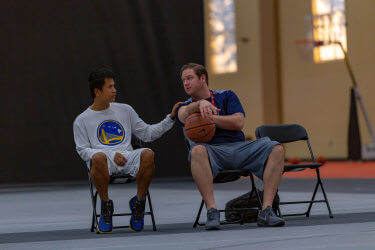
Stephen Carter (right). Photo Credit MD Janiska
Currently an assistant women’s basketball coach at Belmont Abby College, Carter admits his coaching style is a work in progress. But he knows what he believes in and is driven by what he overcame to be at Snow Valley in front of these kids. Life experiences that challenged him, shaped him, and gave him the gift of empathy – an understanding of what a coach’s role is in leading young people. These are traits nurtured in the Snow Valley community. Carter found his niche leading the camp warm-up, a way to continue the legacy of those before him. Others contribute in a different manner.
After working a number of sessions each summer at Snow Valley Iowa, Cam Schuknecht and Mark Franzen were interested in starting a Snow Valley Basketball School. In 2004, Franzen was named the head men’s basketball coach at Nebraska Wesleyan University (NWU). He hired Cam Schuknecht as his assistant coach. Already established as Snow Valley Guys, they received approval from Showalter and Slykhuis to begin Snow Valley at Nebraska Wesleyan in the summer of 2005. The camp became a satellite camp of Snow Valley Iowa.
“We would work with Showalter and Slykhuis hand-in-hand on running the camp. We talked with Showalter frequently regarding the administration and details of running the camp,” says Schuknecht. “Participation numbers were strong, and we were able to attract a quality staff.” Franzen left in 2006 to lead the Luther College Men’s program. Schuknecht assumed the reigns of the NWU program and continued the camp. Snow Valley at Nebraska Wesleyan ran nine summers over ten years. Beyond Snow Valley at Nebraska Wesleyan, other spin-offs from Snow Valley Iowa include Snow Valley Colorado and Snow Valley Missouri.
In the early years of Snow Valley, Livsey also ran satellite camps. In the 1970’s, with the help of Snow Valley coaches, Livsey took Snow Valley to Hawaii. The Vulcan Camps, with a Snow Valley structure, still operate today at the University of Hawaii-Hilo (O’Rear, 2017). For a number of years, Livsey would take coaches up to Sitka, Alaska and run “Snow Valley North” over the Labor Day weekend. Two Snow Valley California coaches, Kenny Hoffpauir and Barry Boren founded the Texas Preps Basketball School in 2003. Each spin-off contributes to the Snow Valley legacy in teaching the fundamentals of basketball.
Livsey’s legacy is carried on by each of the coaches that worked Snow Valley over the years. But for Livsey, Don Showalter has perhaps been the perfect ambassador to impart the Snow Valley Way on future generations of coaches through Snow Valley Iowa. Livsey enhanced Showalter’s career as a mentor, exposing him to new ways of teaching and connections to a greater basketball community. Today, coaches working Snow Valley Iowa hold Showalter in high regard. They want to please him. His mere presence brings a higher standard. It’s a similar stature coaches held toward Livsey for 40 years in California. Showalter’s passion for teaching the fundamentals of basketball, his commitment to developing the coaches that teach the game, and his connections around the globe have positioned him to carry on the legacy of Snow Valley.
As Snow Valley Iowa enters its 27th year, the Snow Valley Basketball School in Santa Barbara nears its 60–year anniversary in 2021. Today the camp is owned by US Sports Camps.
Hall of Fame
The Naismith Memorial Basketball Hall of Fame in Springfield, Massachusetts is home to 104 coaches. A few of them spent time at Westmont College each summer and many more implemented Snow Valley concepts as teachers of the game. The Hall of Fame also honors 71 contributors to the sport. Familiar names include Dick Vitale, the enthusiastic basketball analyst; George Raveling, retired coach and long-serving ambassador of the game; and the late Tex Winter, the architect of the triangle offense that produced nine NBA championships (Naismith Memorial Basketball Hall of Fame, 2018).
In time, Herb Livsey may join them. As a life-long educator, he changed the game of basketball. He followed his passion early in life. He believed in teaching fundamental basketball skills and through the Snow Valley Basketball School influenced how generations of coaches taught the game.
Read Part I here – Part II here – Part III here
Author Note
This story could not have been written without the thoughtful contributions of Snow Valley coaches that worked at the basketball school over the years. Although many of them were mentioned throughout the 4-part series, many more contributed. Each providing insight on the importance of Snow Valley in their development as a coach. I hope the story captures the essence of what coaches gained from working Snow Valley and provides insight to others on the importance of finding a supportive learning environment for personal and professional growth.
——–
References
Aguirre, J. (2016, December 21). Iowa High School Hall of Fame basketball coach, wife die in car crash.Des Moines Register. Retrieved from: https://www.desmoinesregister.com/story/sports/high-school/2016/12/21/iowa-high-school-hall-fame-basketball-coach-wife-die-car-crash/95695298/http://californiasportshalloffame.org/inductees/stan-morrison/
California Sports Hall of Fame (2018). Stan Morrison. Retrieved: http://californiasportshalloffame.org/inductees/stan-morrison/
Naismith Memorial Basketball Hall of Fame (2018). Hall of famers. Retrieved from: http://www.hoophall.com/hall-of-famers/
O’Rear, B. (2017, June 4). Basketball: Vulcan Camp goes old school. Retrieved from: https://www.hawaiitribune-herald.com/2017/06/04/sports/basketball-vulcan-camp-goes-old-school/

1 Comment